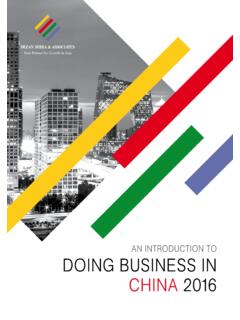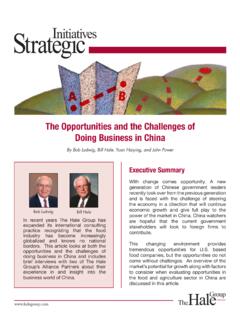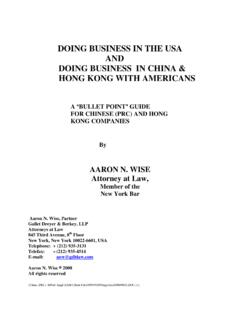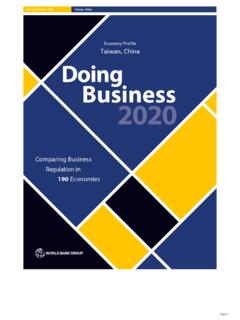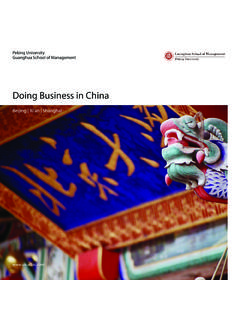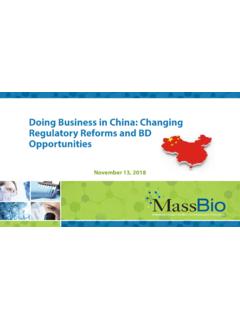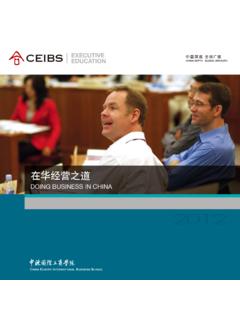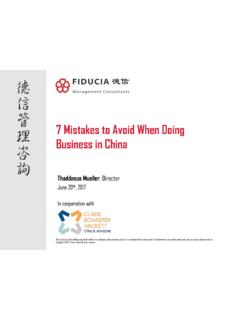Transcription of Doing Business in China: The Interplay between Parental ...
1 Doing Business in China: The Interplay between Parental and Governmental InfluenceRuixue Jia , Xiaohuan Lan and Gerard Padr o i Miquel May 29, 2018 AbstractThis paper investigates how the political background of parents matters for chil-dren s Business ownership in China. Using multiple waves of a nationally representativesurvey between 2005 and 2012, we first evaluate the advantage of having cadre par-ents for becoming a Business owner. Then, we document that the advantage increaseswith state involvement in the economy proxied by government spending on Business -related activities. We further exploit the Fiscal Stimulus Package in 2009 for exogenousvariation in government Business spending. Additional evidence from firm-level sub-sidies and subjective evaluation of factors that matter for success sheds light on themechanism.
2 School of Global Policy and Strategy, UCSD, and CIFAR, School of Economics, Fudan University, Department of Economics, LSE, IntroductionExisting literature on entrepreneurship has documented that family background plays a keyrole in Doing Business . For instance, Business owners are more likely to be from an familywith Business this paper, we try to answer related but very different the political background of parents matter for the children s probability of becomingbusiness owners? When and in what way does it matter? On the one hand, it might be takenfor granted that children whose parents have political connections would benefit from thoseconnections in their Business . For instance, the term crony capitalism is coined to describean economy in which political connections determine Business success and has been argued tobe an important phenomenon in many the other hand, from the Americancapitalism to the East Asian capitalism, the importance of political connections could varysubstantially depending on how dominant a role that the government plays in the economy(Campos and Root 1996, Zingales 2012), which has not been much tested paper aims to provide empirical evidence as to how Parental traits particularlyparents political background and the role of the government affect Doing Business usingmicro data from China.
3 As an example of fast-changing economy where the state plays adominant role and the traditional culture esteems family ties, China provides an appropriateresearch ground to investigate how the Interplay of the political economic environment andparental traits affects children s careers. Anecdotal evidence suggests that children who havea parent working in government ( a cadre parent henceforth ) enjoy certain advantages re-lated to running a Business in China, which has captured massive media Lindquist, Sol, and Van Praag (2012) for recent empirical evidence and a literature more discussions on crony capitalism in different parts of the world by the Economist (2014).3 Among officials convicted of corruption, many cases involve their children who take advantage of theofficial s power for their own firms.
4 For example, a son of Jiating Li, the convicted former governor of Yunnanprovince, made a large illegal profit in real estate development (the story is from the Xinhua News Agency,the largest news agency in China, ). Thedaughter and the son-in-law of Suixin Mu, the convicted former mayor of Shenyang, monopolized the businessof billboard ads in the city (the story is from the People s Daily, the most influential official newspaperfrom the Communist Party of China, ). For moreevidence that political connections influence the performance of Chinese firms, see Fan, Wong, and Zhang(2007) and Li et al. (2008).2systematic data analysis, however, it is difficult to know whether this is a general pattern orwhether it depends on government multiple waves of a nationally representative survey between 2005 and 2012, wefirst document a positive correlation between having a cadre parent and the probability ofbecoming a Business owner: having a cadre parentsweaklyincreases the probability of beinga Business owner by about percentage points.
5 This is a sizable effect since businessowner is an elite occupation and the mean probability is around two percentage main interest, however, is to understand how the role of Parental backgroundvaries by government involvement in the economy proxies by government spending (thefiscal spending of the residential province divided by the provincial GDP). We focus on thismeasure for three reasons. First, this measure has been shown to be useful in capturing theinfluence of the government on economic activities ( , Alesina et al. 2002). Second, thevariation in government spending often stems from historical legacies such as the importanceof state owned enterprises in the 1980s in a province. Thus, as we will document, governmentspending reflects a government development strategy, which is slow-moving over time.
6 Third,we can exploit a national-level policy shock, namely the Fiscal Stimulus Package launchedin 2009, for exogenous variation in government main empirical challenge to our study is that government spending may be becorrelated with other provincial characteristics such as the stage of development. We addressthis challenge in several ways. First, one advantage in our context is that we can separategovernment spending on Business activities ( government Business spending henceforth)from that on public goods. We find that a one standard deviation increase in governmentbusiness spending (2% of GDP) increases the effect of having a cadre parent by percentage points. In contrast, there is no similar pattern with respect to non-businessspending such as the expenditure on education, health and social security, implying that theeffect of government spending is specific to its involvement in Business .
7 Second, our findingshold for provinces with both relatively high GDP per capita and relatively low GDP per3capita, suggesting that our results are not driven by development per se but developmentstrategy by the government. Finally, we find that the effect of cadre parents is larger after theStimulus Package in provinces with a higher benchmark Business spending, thus providingfurther evidence on the role of government findings are robust to including detailed individual characteristics (education, age,gender and others) as well as their interaction with government spending. Moreover, thereis no similar interaction between entrepreneurial parents and government spending, showingthat the effect on Doing Business is specific to the political capital of the are the mechanisms underlying these empirical patterns?
8 We consider threebroad hypotheses: genetic transmission of traits, human capital accumulation, and social andpolitical connections and find that our results are more consistent with the role of politicalconnections. To further shed light on the mechanism, we show that Business spending bythe governments is positively associated with subsidies to firms. In addition, we also findthat Business owners are more likely to identify political connections as a key determinantin career success and this attitude is even more salient in provinces with more governmentspending on study contributes to several lines of literature. First, we present evidence of cronycapitalism from an inter-generational perspective. Compared with most research on the valueof acquired political connections, people with a cadre parent are born with some politicalconnections that are likely to be , we measure parents job status priorto when their children reach adulthood.
9 While government officials status is likely to beinfluenced by their Business allies, this definition of parents status is unlikely to be affectedby their children s career years from the literature on inter-generational4 For some examples of the value of acquired political connections in China, such as having friends ingovernment or direct participation in politics, see Li, Meng, and Zhang (2006) and Li et al (2008). Moreexamples beyond China include Fisman (2001), Khwaja and Mian (2005) and Faccio (2006). Desai andOlofsgard (2011) emphasize the costs as well as the benefits of political connections for contributions to election campaign funds, Business people are able to help their political alliesin many other ways during transitions in political power.
10 See recent evidence from France (Bertrand et ), India (Sukhtankar 2012), and China (Lan and Li 2014).4welfare dependency that documents how Parental wealth affects children s education andlabor market outcome ( , Behrman and Rosenzweig 2006), we emphasize how the parents-children link at the micro level gets shaped by macro study joins the empirical works that investigate how parents job connectionsaffect children s job choice ( , Magruder 2010, Kramarz and Skans 2014). The existingstudies usually focus on the parents-children link in the same sector. Ours contributes tothis line of research by exploring the parents-children link across public-private , the large empirical literature on the determinants of entrepreneurship em-phasizes both entrepreneurial genes and Business environments, but usually also find that having a Business parent increases the chance of becoming a complement these studies by investigating how the parents-children link acrosssectors changes with the role of rest of the paper is organized as follows.
